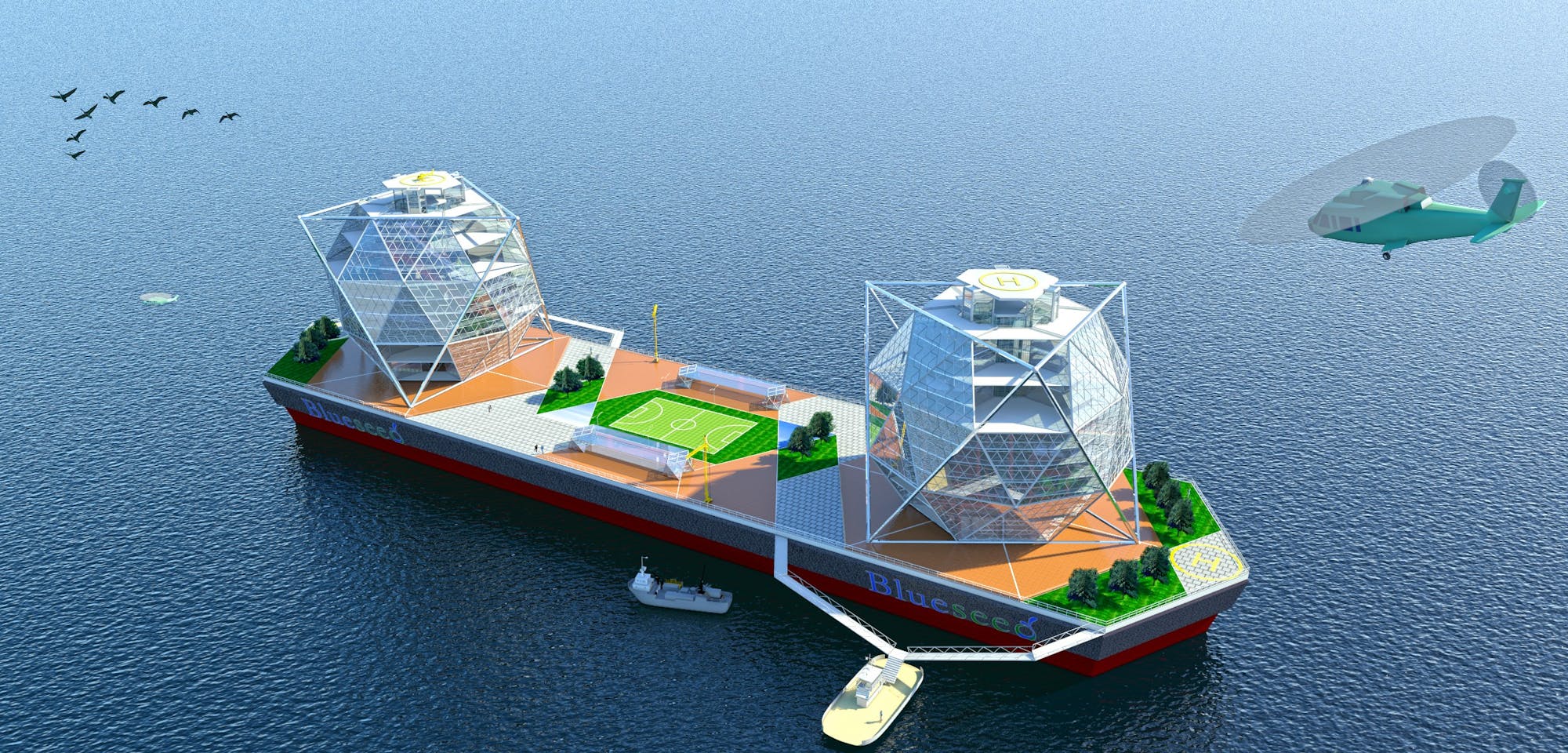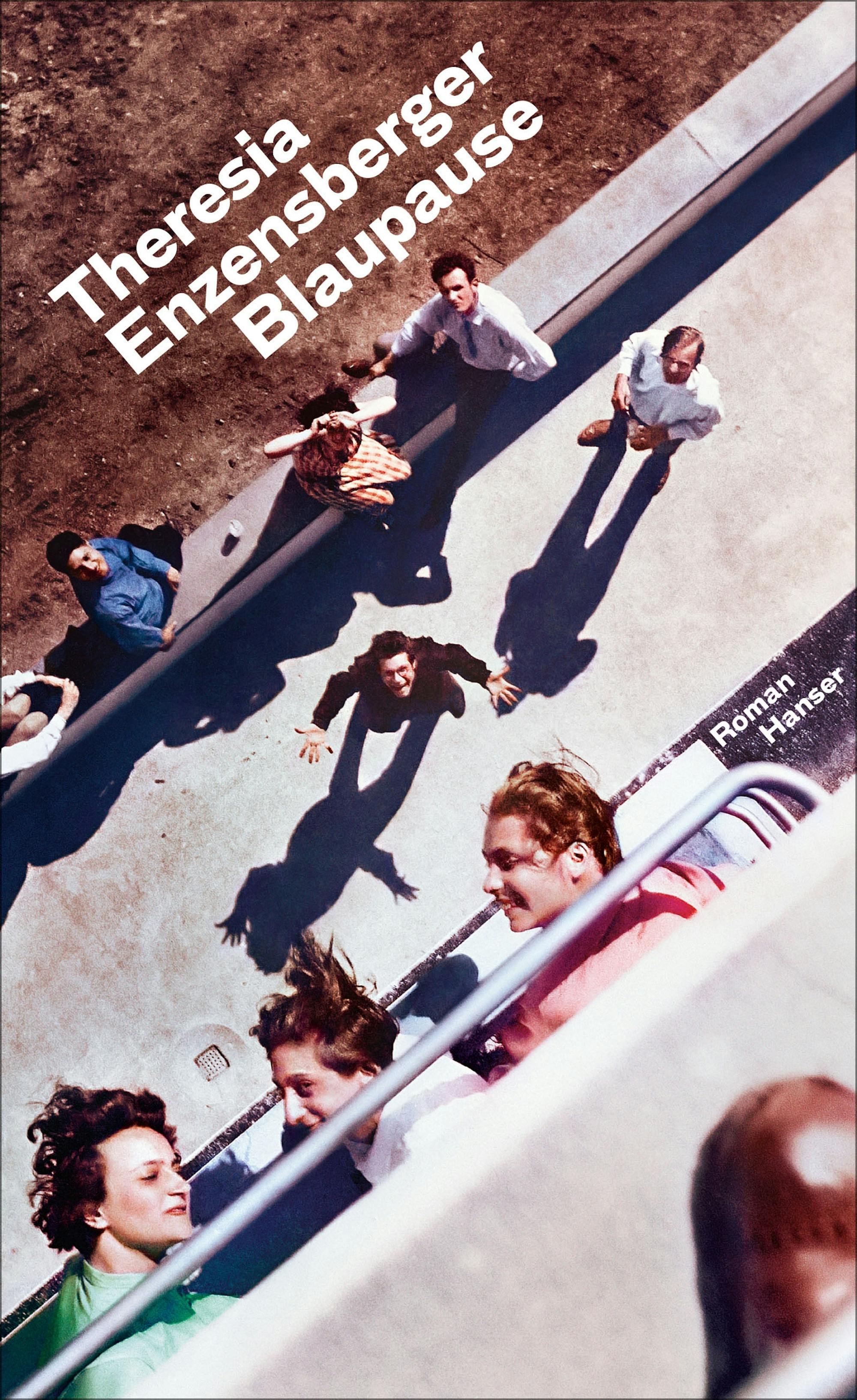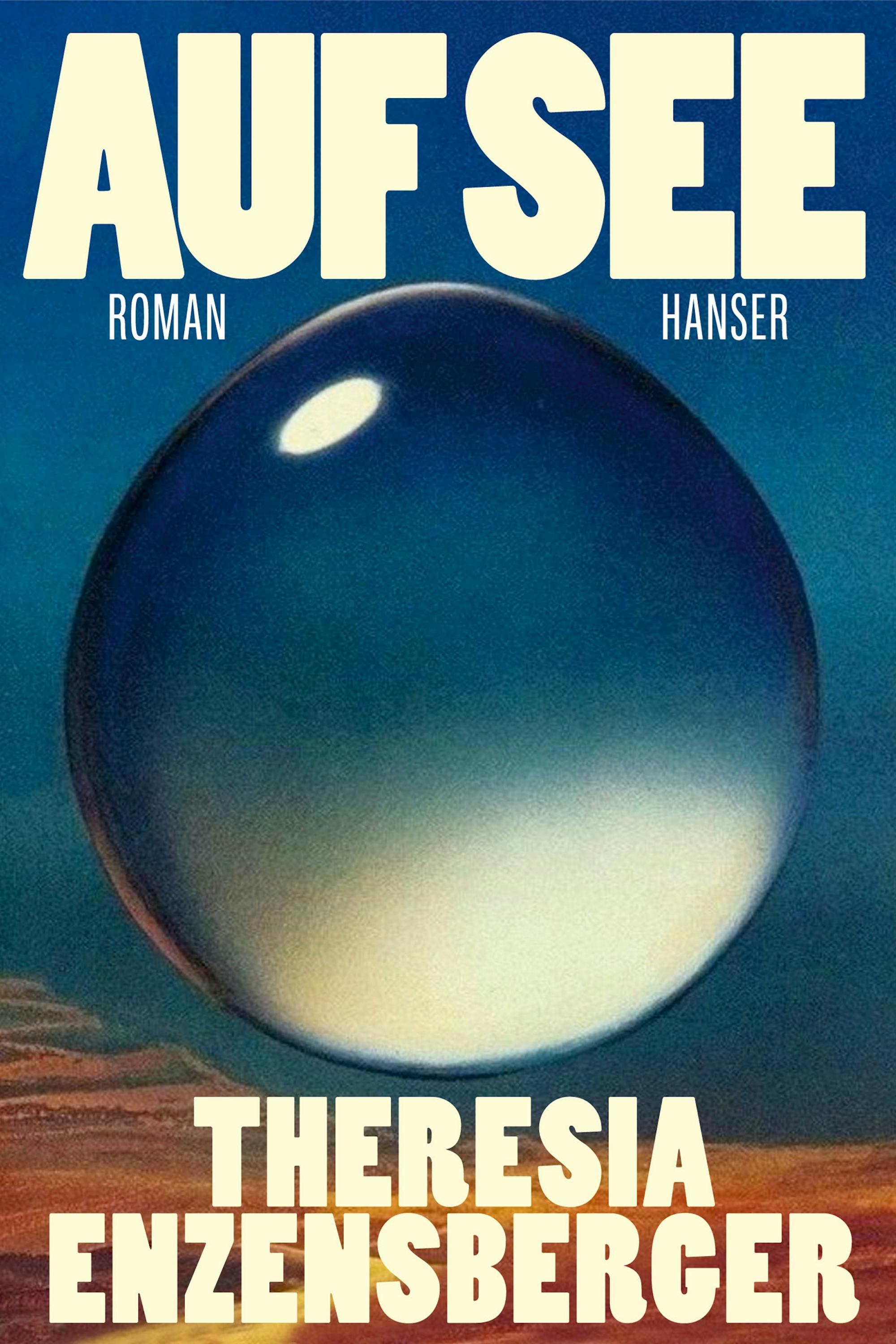A conversation with Theresia Enzensberger about her novels Blaupause and Auf See and the hopes and fears, the ideologies and fringe ideas driving utopian visions – now and a hundred years ago.

"Something I wanted to capture in my writing: how modern and truly foreign the Bauhaus style was."
Patrik Gräb: Your first novel Blaupause follows Luise, who in 1921 enrolls as a student at the Bauhaus school of architecture in Weimar. At this point the Bauhaus is still a very new idea and institution.
Theresia Enzensberger: To Walter Gropius, the founder of the Bauhaus, the idea of the ‚Gesamtkunstwerk’ was essential. Similar to the medieval Bauhütte, his vision of the Bauhaus was a place where all the crafts would come together, a laboratory of different disciplines all working on the same project. Gropius managed to bring together some of the most eminent artists and architects of the day: Paul Klee, Wassily Kandinsky, Oskar Schlemmer, Lyonel Feininger among them.
We are in 1919, right after the catastrophe of the First World War. Architecturally and aesthetically, the founding of the Bauhaus marks an astonishing break with the ornate styles of Historicism and Art Nouveau that preceded this new language of forms.
This is something I wanted to capture in my writing: how modern and truly foreign the Bauhaus style was to its contemporaries. The war acted as a catalyst: When my protagonist Louise says she wants to tear down the past and build a new future, I think it captures a feeling shared by many young people at the time. The past suddenly seemed very stuffy.
Who is Luise? What are her ideals when she comes to the Bauhaus school and how do these ideals change throughout the course of the novel?
At the beginning, Louise is very excited about the great modernist revelation: we can do away with ornaments, everything is functional, all of that - but then, for a while at least, she falls in with the esoteric circle that quickly formed around Johannes Itten and his students, representing a very different intellectual current present in early Bauhaus thought.

"Disenchantment made people want to go back to a world imbued with mystery and magic."
How unusual was it for Louise, as a woman, to study at the Bauhaus?
On paper the Bauhaus was very progressive in that it allowed women to enroll, but then in reality a lot of them got relegated into fields that were considered more domestic, such as weaving. This was because Gropius and others feared that the Bauhaus idea of integrating craft into architectural practice would be compromised if it came to be seen as too female.
Ironically, women like Gunta Stölzl, who went on to direct the Bauhaus weaving workshop, proved extremely innovative, experimenting with textiles that reflected heat and light, incorporating technology into their work. In the novel, Luise is determined to study architecture proper, but it’s part of her journey that she has to overcome a lot of these obstacles before she is allowed to.
Part of that journey is that Louise also encounters the more esoteric strands present at the school. Mystic ideas that are quite different from the rational ethos we usually associate with the Bauhaus movement.
It was a movement that had its origins around the turn of the century. At the Bauhaus, it was led by Johannes Itten. Itten was somewhat of a self-styled Guru. His followers ate vegetarian and engaged in weird rituals. While Gropius thought a lot about technology and the future, the outlook of these neo-romantics, as I call them, was oriented towards a supposedly pre-modern, pre-industrial ‘wholeness’ of life and art.
On the one hand, you have the Gropius-Bauhaus, with it’s complete break from the past and its embrace of modern technology and modern aesthetics. On other hand you have – at the same school – this strange esotericism and longing for the return to an imagined pre-industrial way of living. Did these two movements necessitate each other?
Societies around that time, the time of the second industrial revolution, were experiencing a big leap forward in technology. At the same time, this change gave rise to fears that now, everything could be calculated, everything had become quantifiable. It’s what Max Weber calls „die Entzauberung der Welt“, the disenchantment of the world. It made people want to go back to a world imbued with mystery and magic, something they had in common with the romantics a century before them.
"I wanted it to be a novel without ornament, so to say, with great attention to the perfection of craft."
Blaupause is a historical novel. How does one go about writing a book that is set one hundred years ago? And how is conducting the necessary research for a such a novel different from historical research for say, an academic paper?
Luise is a made-up character and so are all her friends in the novel. I felt that if the characters were fictitious, everything else had to be meticulously researched. Yet in order to imagine a scene in a novel you have to research so much more than if you were writing an essay about the period. For example, I would spent a whole day trying to research whether electric door bells were already in use back then. It’s hard to know where to even look for little details like that.
The novel is set in the past, yet it doesn’t read like a historical novel – stylistically it feels very modern.
The idea was to get away from all of that: I wasn’t trying to imitate historical speech. There is a reason I called the book Blueprint: I felt that what happened back then is similar to what is happening today, and I wanted the book’s style to reflect that. The style is obviously also informed by the aesthetic paradigm of the Bauhaus: I wanted it to be a novel without ornament, so to say, with great attention to the perfection of craft.
You spoke of the parallels between the 1920s and now. Where do you see them?
The most obvious answer is perhaps the rise of the far right, which in 2017 – when I wrote the novel – felt new in a different way than it does now perhaps. The Weimar Republic was a time of great political upheaval. Public discourse was extremely polarized and its striking how similar discussions of the time feel to the ones we are heaving today. Yet, what fascinated me was also what was different from today: all these political ideologies, communism, fascism, hadn’t really been tried out yet in Germany, so talking about them was a very different experience in the 1920s – one I found difficult but fascinating to imagine.

"I was wondering how the thinking of powerful people that are so obsessed with the future actually shapes our present."
Your new novel Auf See – At Sea – deals with another movement arguing for a radically different way living together.
Yada, the protagonist of Auf See, grows up on an artificial island nation, a so-called „seastead“ in the Baltic sea. Seasteading is something I became very interested in. It is an ideology promoted by radical libertarians and prominent Silicon Valley oligarchs – Peter Thiel among them. Many of them look to seasteads as places of refuge for when the apocalypse comes, which they believe is imminent.
I think it is fascinating that these out-there theories, conspiracy theories even, are so virulent among people that have a lot of influence over the way we live. I was wondering how the thinking of powerful people that are so obsessed with the future actually shapes our present.
So, in essence, seasteading is this idea that you can build your own island in the middle of the ocean, establish it as a sovereign nation and thus be safe from the impending apocalypse?
The seasteading movement presents these projects as sort of city states. The propagate the concept of „competitive governance“, which is the idea that all these micro-nations are in competition with each other. They form a marketplace of ideas in which the best island with the best government eventually will win out and all the other island cities will attach to it to form a bigger state.
Recently, though, the efforts of the Seasteading movements have become less ambitions. Now the focus is on what they call „free cities“. The supposed appeal of these free cities is that they are free from oversight, implying that these are places in which you can do whatever you want: no regulation, no taxes, no labor oversight. Depending on who you ask and how radical they are, the government on these islands is itself to function like a cooperation with the citizens as shareholders….
…and presumably you can pay with bitcoin everywhere.
Some people even launched their own initial coin offering! It really is a kind of glorified crowd funding.

"I was interested in islands as places where the nation state and its signifiers – borders, passports and so on – become visible as a fictitious construct."
Let’s return to your novel. Who is your protagonist Yada and why does she live on a seasted?
Yada is there because of her father, who is the founder of the seastead. At the start of the novel, it has been in existence for ten years – Yada has been told that the mainland, which is Germany, is in chaos. It’s unclear how bad it is, but you’re definitely not supposed to go there. So Yada grows up very isolated, she has a very strict daily schedule, consisting of exercise, business education as well as science, but – importantly – no music or any kind of art.
This book in many ways feels very different from your first book, least of all because Blaupause was set roughly 100 years from now, whereas Auf See takes place in a near present future. What are the interests that carried over?
Well, the aspect of technology is a longstanding interest. If Blaupause was about the second industrial revolution, this is about the third, the digital revolution. Auf See also tells the story of Yada’s mother Helena. Helena lives in a libertarian future Berlin – more skyscrapers, but also more homelessness – and she has become something o an overnight sensation. Several years ago, out of boredom, Helena made twelve prophecies and six of them came true and as a result, people have come to think of her as an oracle. I think the Helena part of the novel is another exploration of peoples longing for something inexplainable in a world that has become very explainable and quantifiable.
Blaupause had this very rational, clean cut structure to it. Auf See feels much more elaborate. You mentioned earlier that it shares certain similarities to the gothic novel of the 18th and 19th century. Would it be fair to say that it is a novel of the future that takes on a historical form?
I very deliberately thought about the gothic novel as a genre. I wanted to experiment with the tropes of that genre in a Sci-Fi setting: so the Seasted becomes the run down castle, Yada is the captured, sleepwalking princess. At the same time I was interested inversions of the genre from a gender perspective: Helana with her cult following is somewhat modeled on Lord Byron, the romantic 19th-century poet, and Yada is loosely based on Byron’s daughter Ada Lovelace, inventor of the algorithm. Just like Yada, Ada Lovelace was not allowed to engage with any art or music because her mother feared it could make her susceptible to same mental illness that had gripped her father. In Auf See, it is Yada’s tech-obsessed father that banns art from her education.
Another hallmark of the gothic novel is the inclusion of a wide array of literary forms, such as letters or diary entries. Your novel also features different types of texts, the main narrative is broken up by these non-fiction essays. They tell the stories of previous historical attempts to establish - more ore less - utopian island communities.
The essays are concerned with micro-nations, islands, things that happen on the ocean. I was interested in islands as places where the nation state and its signifiers – borders, passports and so on – become visible as a fictitious construct. Of course, the island is also inextricably linked to utopia. In the cultural imagination the uninhabited islands represents a clean slate for political experimentation. Which is of course in itself a deeply problematic notion, the idea of a terra nullius that was used as justification for colonialism. Thus the question is always: utopia for whom? The visions of seasteaders might be dystopia for me – for Peter Thiel it is utopia.
Theresia Enzensberger
Born in Munich, novelist Theresia Enzensberger studied film at Bard College in New York. Her writing has appeared in Frankfurter Allgemeine Zeitung, Die Zeit, NZZ and Monopol. BLOCK Magazine, founded by Enzensberger, won a Lead Award in 2016.
Enzensberger’s debut novel Blaupause (2017), set in the 1920s at the revolutionary Bauhaus school of architecture, was awarded the Alfred-Döblin-Medal in 2019. Her second novel, Auf See (2022), is concerned with the radical libertarian visions informing the so-called Seasteading movement.